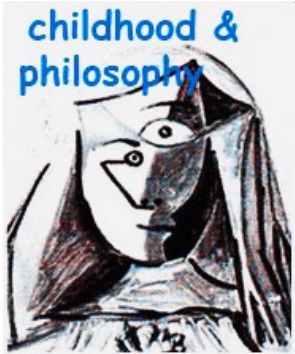escolaridade, comunidade de investigação filosófica e uma nova sensibilidade
DOI:
https://doi.org/10.12957/childphilo.2023.74061Palavras-chave:
estudos sobre a democracia, psicologia evolutiva, filosofia da infância, educação dialógica, comunidade de investigação filosóficaResumo
Este artigo busca reconstruir o papel da escolaridade em um momento de acelerada crise social, política, econômica, geopolítica, climática e até mesmo planetária. Identifica a escola como uma instituição potencialmente prefigurativa, uma fronteira social evolutiva capaz de alimentar o caráter social democrático, uma forma de sensibilidade sem a qual nenhuma democracia política autêntica é possível. Como teorizado por Herbert Marcuse, Richard Hart e Antonio Negri, a “nova sensibilidade” ou “multidão” é caracterizada por uma grande liberdade psicológica, individualidade, criatividade social e auto-governo, compreendendo um “todo de singularidades” que “age em comum”. Sugere um sujeito humano com um impulso vital e biológico para a libertação, com uma consciência capaz de romper o véu material e ideológico de uma sociedade baseada na hierarquia e na dominação, e está politicamente associada à democracia e ao social-anarquismo, ou ao que Murray Bookchin chamou de “comunalismo”. Este artigo identifica três características principais de uma instituição embasada nessa forma de subjetividade modal, todas elas baseadas no diálogo aluno-professor: um currículo emergente baseado em projetos, uma governação democrática direta a todos os níveis da comunidade escolar, e a prática regular da investigação filosófica comunitária, através da qual problematizamos os conceitos que orientam nossas vidas, com vista à sua reconstrução contínua.
Downloads
Referências
Bookchin, M. (2005). The Ecology of Freedom. Oakland CA: AK Press.
Bowen, J. (1970). A History of Western Education. The Ancient World: Orient and Mediterranean (Vol. 1). London: Methuen.
Corrington, R. S. (1992). Signs of Community. In Nature and Spirit: An Essay on Ecstatic Naturalism (pp. 83-119). New York: Fordham University Press.
Deleuze, G., & Guattari, F. (1987). A Thousand Plateaus: Capitalism and Schizophrenia. Translated by B. Massumi. Minneapolis: University of Minnesota Press.
deMause, L. (ed.). (1974). The History of Childhood. New York: Harper & Row.
Dewey, J. (1916). Democracy and Education. New York: Macmillan.
Dewey, J. (1922). Human Nature and Conduct: An Introduction to Social Psychology. New York: Henry Holt & C.
Fielding, M., & Moss, P. (2011). Radical Education and the Common School: A Democratic Alternative. London: Routledge.
Freire, P. (1965). Pedagogy of the Oppressed. New York: Continuum.
Graeber, D. (2004). Fragments of an Anarchist Anthropology. Chicago: Prickly Paradigm Press.
Hardt, M., & Negri (2004). Multitude: War and Democracy in the Age of Empire. New York: Penguin Books.
Krätzä. (2006). Democratic Schools. [VIDEO] https://www.youtube.com/watch?v=PfMk-cpXAP8&ab_channel=KR%C3%84TZ%C3%84
Malaguzzi, L. (1994). Your Image of the Child: Where Teaching Begins. Exchange 3. (March/April) http://exchangepress.com/article/your-image-of-the-child-where-teaching-begins/5009652/
Marcuse, H. (1969). An Essay on Liberation. Boston: Beacon Press.
Masschelein, J., & Simons, M. (2013). In Defense of the School: A Public Issue. Translated by J. McMartin. Leuven: Culture & Society Publishers.
Pearce, J. C. (2002). The Biology of Transcendence: A Blueprint of the Human Spirit. Rochester VT: Park Street Press.
Peirce, C. S. (1893). Evolutionary Love. The Monist. 3, 176-200.
Plato. (1961). Republic. Translated by P. Shorey. In The Collected Dialogues of Plato (pp. 575-844). Edited by E. Hamilton and C. Huntington. Princeton NJ: Princeton University Press.
Sorin, R. (2005). Changing Images Of Childhood: Reconceptualising Early Childhood Practice. International Journal of Transitions in Childhood 1(1), 12-21.




